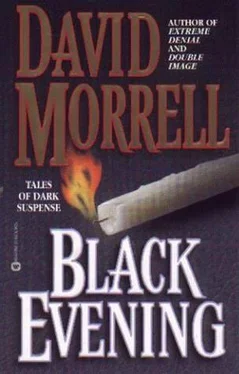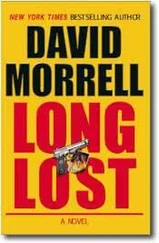David Morrell - Black Evening
Здесь есть возможность читать онлайн «David Morrell - Black Evening» весь текст электронной книги совершенно бесплатно (целиком полную версию без сокращений). В некоторых случаях можно слушать аудио, скачать через торрент в формате fb2 и присутствует краткое содержание. Жанр: Ужасы и Мистика, на английском языке. Описание произведения, (предисловие) а так же отзывы посетителей доступны на портале библиотеки ЛибКат.
- Название:Black Evening
- Автор:
- Жанр:
- Год:неизвестен
- ISBN:нет данных
- Рейтинг книги:4 / 5. Голосов: 1
-
Избранное:Добавить в избранное
- Отзывы:
-
Ваша оценка:
- 80
- 1
- 2
- 3
- 4
- 5
Black Evening: краткое содержание, описание и аннотация
Предлагаем к чтению аннотацию, описание, краткое содержание или предисловие (зависит от того, что написал сам автор книги «Black Evening»). Если вы не нашли необходимую информацию о книге — напишите в комментариях, мы постараемся отыскать её.
Black Evening — читать онлайн бесплатно полную книгу (весь текст) целиком
Ниже представлен текст книги, разбитый по страницам. Система сохранения места последней прочитанной страницы, позволяет с удобством читать онлайн бесплатно книгу «Black Evening», без необходимости каждый раз заново искать на чём Вы остановились. Поставьте закладку, и сможете в любой момент перейти на страницу, на которой закончили чтение.
Интервал:
Закладка:
"Forever."
"It seems that long. But I knew. I was right."
"A secret."
When I was a boy, my father – how I loved him – took me mushroom hunting. We drove from town, climbed a barbed-wire fence, walked through a forest, and reached a slope of dead elms. My father told me to search the top of the slope while he checked the bottom.
An hour later, he came back with two large paper sacks filled with mushrooms. I hadn't found even one.
"I guess your spot was lucky," I said.
"But they're all around you," my father said.
"All around me? Where?"
"You didn't look hard enough."
"I crossed this slope five times."
"You searched, but you didn't really see," my father said. He picked up a long stick and pointed it toward the ground. "Focus your eyes toward the end of the stick."
I did.
And I've never forgotten the hot excitement that surged through my stomach. The mushrooms appeared as if by magic. They'd been there all along, of course, so perfectly adapted to their surroundings, their color so much like dead leaves, their shape so much like bits of wood and chunks of rock that they'd been invisible to ignorant eyes. But once my vision adjusted, once my mind reevaluated the visual impressions it received, I saw mushrooms everywhere, seemingly thousands of them. I'd been standing on them, walking over them, staring at them, and hadn't realized.
I felt an infinitely greater shock when I saw the tiny faces Myers made me recognize in Van Dorn's Fir Trees at Sunrise . Most were smaller than a quarter of an inch, hints and suggestions, dots and curves, blended perfectly with the landscape. They weren't exactly human, although they did have mouths, noses, and eyes. Each mouth was a black, gaping maw, each nose a jagged gash, the eyes dark sinkholes of despair. The twisted faces seemed to be screaming in total agony. I could almost hear their anguished shrieks, their tortured wails. I thought of damnation. Of Hell.
As soon as I noticed the faces, they emerged from the swirling texture of the painting in such abundance that the landscape became an illusion, the grotesque faces reality. The fir trees turned into an obscene cluster of writhing arms and pain-racked torsos.
I stepped back in shock an instant before the guard would have pulled me away.
"Don't touch the – " the guard said.
Myers had already rushed to point at another Van Dorn, the original Cypresses in a Hollow . I followed, and now that my eyes knew what to look for, I saw small, tortured faces in every branch and rock. The canvas swarmed with them.
"Jesus."
"And this!"
Myers hurried to Sunflowers at Harvest Time , and again, as if a lens had changed focus, I no longer saw flowers but anguished faces and twisted limbs. I lurched back, felt a bench against my legs, and sat.
"You were right," I said.
The guard stood nearby, scowling.
"Van Dorn did have a secret," I said. I shook my head in astonishment.
"It explains everything," Myers said. "These agonized faces give his work depth. They're hidden, but we sense them. We feel the anguish beneath the beauty."
"But why would he – "
"I don't think he had a choice. His genius drove him insane. It's my guess that this is how he literally saw the world. These faces are the demons he wrestled with. The festering products of his insanity. And they're not just an illustrator's gimmick. Only a genius could have painted them for all the world to see and yet have so perfectly infused them into the landscape that no one would see. Because he took them for granted in a terrible way."
"No one? You saw, Myers."
He smiled. "Maybe that means I'm crazy."
"I doubt it, friend." I returned his smile. "It does mean you're persistent. This'll make your reputation."
"But I'm not through yet," Myers said.
I frowned.
"So far all I've got is a fascinating case of optical illusion. Tortured souls writhing beneath, perhaps producing, incomparable beauty. I call them 'secondary images.' In your ad work, I guess they'd be called 'subliminal.' But this isn't commercialism. This is a genuine artist who had the brilliance to use his madness as an ingredient in his vision. I need to go deeper."
"What are you talking about?"
"The paintings here don't provide enough examples. I've seen his work in Paris and Rome, in Zurich and London. I've borrowed from my parents to the limits of their patience and my conscience. But I've seen, and I know what I have to do. The anguished faces began in 1889, when Van Dorn left Paris in disgrace. His early paintings were abysmal. He settled in La Verge in the south of France. Six months later, his genius suddenly exploded. In a frenzy, he painted. He returned to Paris. He showed his work, but no one appreciated it. He kept painting, kept showing. Still no one appreciated it. He returned to La Verge, reached the peak of his genius, and went totally insane. He had to be committed to an asylum, but not before he stabbed out his eyes. That's my dissertation. I intend to parallel his course. To match his paintings with his biography, to show how the faces increased and became more severe as his madness worsened. I want to dramatize the turmoil in his soul as he imposed his twisted vision on each landscape."
It was typical of Myers to take an excessive attitude and make it even more excessive. Don't misunderstand. His discovery was important. But he didn't know when to stop. I'm not an art historian, but I've read enough to know that what's called "psychological criticism," the attempt to analyze great art as a manifestation of neuroses, is considered off-the-wall. If Myers handed Stuyvesant a psychological dissertation, the pompous bastard would have a fit.
That was one misgiving I had about what Myers planned to do with his discovery. Another troubled me more. I intend to parallel Van Dorn's course , he'd said. After we left the museum and walked through Central Park, I realized how literally Myers meant it.
"I'm going to southern France," he said.
I stared in surprise. "You don't mean – "
" La Verge? That's right. I want to write my dissertation there."
"But – "
"What place could be more appropriate? It's the village where Van Dorn suffered his nervous breakdown and eventually went insane. If it's possible, I'll even rent the same room he did."
"Myers, this sounds too far out, even for you."
"But it makes perfect sense. I need to immerse myself. I need atmosphere, a sense of history. So I can put myself in the mood to write."
"The last time you immersed yourself, you crammed your room with Van Dorn prints, didn't sleep, didn't eat, didn't bathe. I hope – "
"I admit I got too involved. But last time I didn't know what I was looking for. Now that I've found it, I'm in good shape."
"You look strung out to me ."
"An optical illusion." Myers grinned.
"Come on, I'll treat you to drinks and dinner."
"Sorry. Can't. I've got a plane to catch."
"You're leaving tonight ? But I haven't seen you since – "
"You can buy me that dinner when I finish the dissertation."
I never did. I saw him only one more time. Because of the letter he sent two months later. Or asked his nurse to send. She wrote down what he'd said and added an explanation of her own. He'd blinded himself, of course.
You were right. Shouldn't have gone. But when did I ever take advice? Always knew better, didn't I? Now it's too late. What I showed you that day at the Met – God help me, there's so much more. Found the truth.
Can't bear it. Don't make my mistake. Don't look ever again, I beg you, at Van Dorn's paintings. Can't stand the pain. Need a break.
Читать дальшеИнтервал:
Закладка:
Похожие книги на «Black Evening»
Представляем Вашему вниманию похожие книги на «Black Evening» списком для выбора. Мы отобрали схожую по названию и смыслу литературу в надежде предоставить читателям больше вариантов отыскать новые, интересные, ещё непрочитанные произведения.
Обсуждение, отзывы о книге «Black Evening» и просто собственные мнения читателей. Оставьте ваши комментарии, напишите, что Вы думаете о произведении, его смысле или главных героях. Укажите что конкретно понравилось, а что нет, и почему Вы так считаете.












